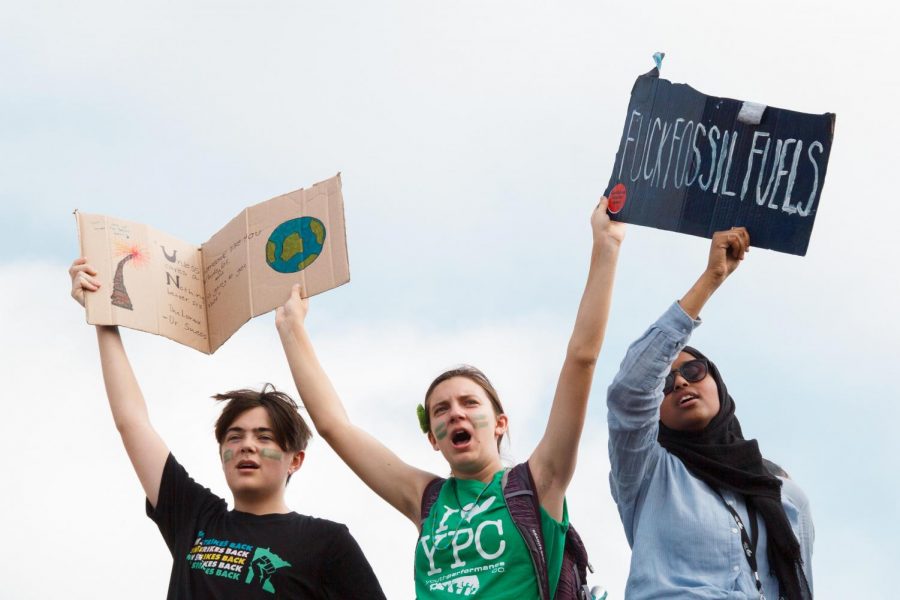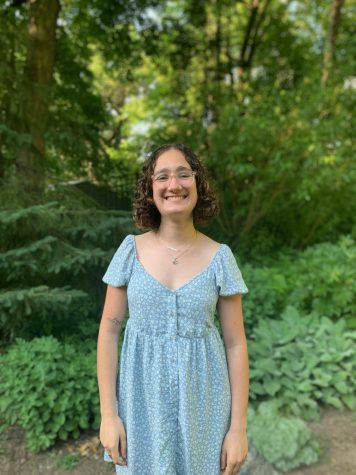Issue based campaigns at Mac: students advocate for change in 2020
Activists raise signs at the Twin Cities Youth Climate Strike in Fall of 2019. Photo by Kori Suzuki ’21.
February 27, 2020
Across campus, students are finding different ways to get involved in the 2020 election. Issue-based campaigns and issue-based activism are avenues for students to support issues they feel passionate about. They don’t stop when elections are over — no matter the year, no matter the person in office, these students continue to fight for their causes.
Saskia Sackner-Bernstein ’21 and Serena Touqan ’22 are two board members on the Macalester student organization, Jewish Voices for Peace (JVP). JVP is a national organization advocating for Palestinian rights. The goal of the organization is to take a stand against Israel’s occupation of Palestine and the human rights abuses taking place.
JVP is currently working to shift national 2020 candidates’ positions on Israeli occupation in order to gain political ground for their cause.
“A lot of these candidates are kind of trying to support Israel when the majority of democratic voters don’t want that,” Sackner-Bernstein said. “They want freedom and justice for all and that includes Palestinians.”
While JVP cannot directly engage with 2020 political processes because of its classification as a 501(c)(3), its sister organization, JVP Action, can. Sackner-Bernstein traveled to Iowa earlier this year with JVP Action to lobby for Palestinian liberation.
“I went to Iowa for a week over winter break with JVP Action to talk to candidates and talk to caucus voters about bringing Palestinian freedom to the presidential election stage,” she said. “The main goal for the trip, and the main goal for JVP Action, is to end funding that we provide for the Israeli military.”
Other organizations follow the same model of JVP — having one organization that works directly for the issue no matter the politics and another one that supports the same issue through electoral processes such as going to caucuses or endorsing candidates.
Margaret Breen ’20 is a board member for MN350 — an organization trying to end fossil fuel pollution and climate change. At Macalester they’ve championed Stop Line 3, but the organization more generally works to fight climate change and fossil fuel consumption state-wide. Their sister organization, MN350 Action, will endorse candidates closer to November, but MN350 is focused on making sure that current candidates come out in support of their issues.
“[We are] ensuring that candidates who have not spoken up for climate justice do so, but furthermore, ensuring that those who have spoken up for climate justice actually act on that, because it’s really easy to say that you support climate justice, and much more rare that you would find elected officials actually acting on that,” Breen said.
Peter Jarka-Sellers ’20 is a co-leader of the St. Paul Citizens Climate Lobby (CCL) chapter. CCL is an organization combatting for climate justice by empowering regular people to work for climate policy and advocating for carbon pricing as a tangible fix for climate change.
Unlike other organizations such as JVP Action or MN350 Action, CCL will not endorse a candidate, and it does not have a sister organization that works directly in the election because it believes that climate change cannot wait for political processes.
“CCL’s slogan is creating the political will for a livable world,” Jarka-Sellers said. “We believe that climate is urgent and important enough that we don’t have time to wait for people who some of us might prefer to be there.”
That doesn’t mean CCL isn’t doing any work for the 2020 election — the organization is reaching out to all candidates, regardless of party affiliation to advocate for their issue.
“CCL takes very seriously… especially in a moment like this, that they’re doing something that is seeking to be unifying, that is seeking to be bi-partisan,” Jarka-Sellers said. “Not that that is easy, but in terms of the health of the country and the health of the political system, if everyone gives up on that and makes no effort to try to build that then it’s never going to exist.”
Mactivists, a Macalester student organization that is a subsect of NARAL Pro-Choice America, echoes CCL’s type of work. For 2020, they are spending their time researching candidates’ positions on abortion and women’s reproductive rights.
Elizabeth Poor ’22 is one of the co-chairs of Mactivists. The organization works to advocate for reproductive and abortion rights, concentrating their efforts in the Twin Cities.
While not directly related to their 2020 work, Poor recognizes the importance of moving reproductive and abortion rights into mainstream discussion. Mactivists face a challenge of normalizing their issue on a bigger stage.
“It’s kinds of interesting how a lot of very important issues like climate change have become more normalized in the [Democratic] party to talk about, but abortion is still a pretty taboo thing to talk about,” Poor said.
Abortion is also usually discussed in the context of the Supreme Court case, Roe v. Wade.
“There’s such a focus on Roe v Wade, and I think the problem is the state of reproductive rights has become too much, in the general public’s mind, of whether Roe v. Wade is a thing,” Poor said. “[The focus] isn’t all of the restrictions that are getting passed continuously against reproductive rights.”
Sunrise Movement is the only one of these issues-based campaigns to have officially endorsed a candidate. Earlier this year the organization endorsed Sen. Bernie Sanders (I-VT) . However, while they have made this political stand, the organization is still committed to working for the Green New Deal and resisting the climate crisis.
Juan David Garrido ’20 is the outreach lead for the Sunrise Movement Twin Cities Chapter. He emphasized how Sunrise Movement’s endorsement of Sen. Sanders means that their work in the primary has expanded to include campaigning for Sen. Sanders and the environmental values he represents, but, the issues are still at the front and center.
“If [Sen. Sanders] gets elected, that’s great,” Garrido said. “But we are still going to be protesting because that is the reality of the political system right now. People have to force their representatives to do things.”
Still, Sunrise Movement isn’t sure what their campaigning will look like come the general election in November.
“As for the actual voting day in November comes up — I’m not sure if we are going to support the Democratic candidate if it’s not [Sen. Sanders],” Garrido said. “We are going to be canvassing for the Green New Deal for sure, regardless of who gets elected.”
The biggest challenge these organizations and students face is informing people about their issues and their causes, and, for some campaigns, getting their issue to be recognized in popular media.
JVP faces this challenge because Palestinian rights generally sits on the peripheral of election rhetoric.
“I think the biggest thing we are fighting is ignorance,” Touqan said. “With regards to that, I think it really affects what’s going on because if you’re ignorant about an issue, you’re only seeing what every news station is putting out. You have so-called progressive people — progressive except for Palestine.”
Sunrise Movement assumes that the people they talk to believe in climate change, which means they spend more of their time swaying people who already believe in climate change to support the Green New Deal and their other policy initiatives than convincing climate deniers to believe in climate change.
“Sunrise [Movement] operates on the assumption that climate change is real, and to have the conversation that climate change is not real is a waste of time and energy that could be spent moving those people that already know that climate change is real — moving them more left and polarizing them a little bit more to bring them to our side,” Garrido explained.
While all of these organizations have specific goals because it is a presidential election year, they all understand the value of issue-based campaigns as sustained movements that can work to change political policy.
For Garrido, issue-based campaigns are more impactful than working directly for one candidate because these campaigns can reflect your personal values more closely.
“If you choose one [candidate], you’re working for what that candidate says, not what you say,” Garrido said. “I believe that working for these broader campaigns can reflect your values more… So I support something that kind of takes a step back — that is a little bit deeper.”
Poor mirrored Garrido’s sentiment.
“I, personally, think issue-based is more impactful because I am not acting as an individual — I am a part of an organization that has a whole network of people committed to the issue,” Poor said. “I think that is more effective than being a single voice within a campaign.”
One of the most distinctive aspects of issue-based campaigns is that they don’t stop when the election is over. Students and organizations continue to resist, no matter who is elected to office. Sackner-Bernstein appreciates this longevity and the wide variety of issues people can choose to engage with.
“I think that the way we are going to find freedom and justice and equality for all is through all of the different activists and organizations,” she said. “The benefit of going and doing an issue-based campaign… is that they can continue after the election cycle and hopefully make a lasting impact on the actual laws.”
The lasting impact of issue-based campaigns beyond 2020, or any election, can be concretely recognized by how much people are talking about it. While that’s not everything, Jarka-Sellers attributes the rise in people talking about climate change to activism.
“People are talking more about climate change now than they were four or five years ago, and I think that’s due in no small part to all of the activism that people have been doing,” he said.
Breen’s experience with MN350’s everlasting work and sustained community has meant she has been able to put in work on a variety of their campaigns and continue to be energized by the different forms the organization takes.
“There’s not a deadline [for MN350] in the sense that we are here to enact climate justice and, we know we will be doing that until…,” Breen said. “Within that, there are life cycles that happen within the movement. Overall, having this sustained movement has been really beneficial for me.”
Apart from specific work towards 2020 or these campaigns’ lifelong work to solve societal-wide issues, they bring to light the problems at the core of our society. In the 2020 election, these campaigns will give voices to voters and show the candidates what is important to the people.
“Real change is built by people in grassroots movements,” Touqan said. “Authority is not going to save us, we need a collective.”
“A lot of times people are trying to find all of the answers first and then take action based on those answers,” Garrido said. “We do have some base-level values and beliefs, and that should be enough to take action and engage with something. It doesn’t matter what you engage with, just engage.”














